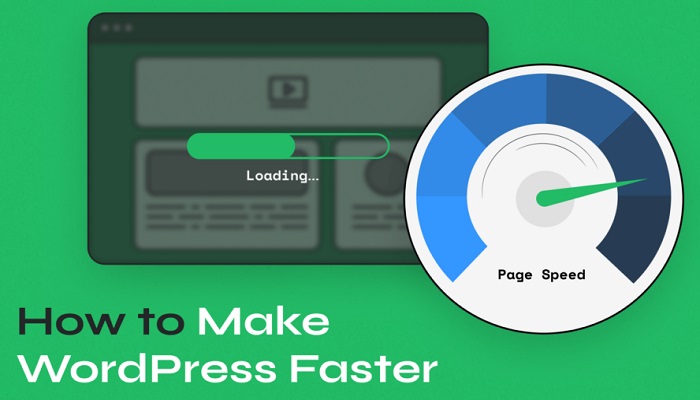If your WordPress blog is slow this article will teach you how to make your WordPress blog load faster in just a few steps. Not minding the kind of hosting your website is on.
If you have been using WordPress for a while – you may have come across a situation when your WordPress site becomes sluggish. This issue can be so annoying – especially for those who understand the negative effects of this single issue.
Because of this so many people are searching for fast WordPress hosting and speed up WordPress site plugins. But it is not the full solution to the problem.
In situations like this, if you don’t resolve it as fast as you can – then you may lose your site traffic. No one likes to visit a slow or sluggish website – no matter how quality its contents may be.
If you are facing this issue – do not worry, you are not alone.
In the post, I will list out the reasons why your WordPress site may get very slow in loading its pages. I will also explain elaborately how this issue can be resolved.
Why Some WordPress Blogs Loads Slow
- Bad web hosting: Before choosing a web hosting perfect for your WordPress, you have to conduct thorough research in other not to make mistakes. Bad web hosting can spell doom to your WordPress site.
- Poor WordPress configuration: All I can say here is if you can’t do it yourself employ the services of a professional.
- Large page size with large images: Avoid uploading large images on your WordPress webpages. Otherwise your site is based on photography or graphics, you should not use any image exceeding 1MB on a webpage. Imagine when you have 10 images of about 1MB each on a single page, that means it will consume about 10MB of data for the page to complete loading.
- Badly coded plugins: Always check reviews on comments of any plugin you wish to add to your WordPress website.
- Plugin conflict: Not all plugins can go together, so you have to be very careful here. Don’t install and activate multiple plugins at the same time. Test your plugin one after the other after activation.
- External scripts from your theme or plugins.
How To Make WordPress Blog Load Faster
1. Optimize WordPress Images
Adding images, especially those with many colors, makes web pages look beautiful, but we must be cautious when we do this. The reason is that images are one of the major reasons why a website takes time to load.
Therefore we are expected to optimize our images before uploading them to our site. To do this, you may have to resize the image or even change its format – in other to reduce image weight.
There is a case where an image of 400KB can be compressed to 50KB, and the image qualities will still be retained.
2. Install a WordPress Caching Plugin
The cache plugin can make your site Load Faster.
WordPress caching plugin helps the web browser to store cached versions of static resources. This process allows webpages to load much faster and at the same time, it reduces server lag.
Your caching plugin makes a copy of each webpage on the browser during the first load and then returns that cached version to every subsequent user on the same browser. Using a caching plugin can speed up your browser speed by 200%.
3. Break Comments into Pages
In other to speed up your WordPress blog and make it load faster, you are expected to break your comments into pages mainly when you are much engaged with your blog readers.
There are cases where a particular post may have up to 300 comments or even more. By this, it may take time to load the blog post and all its commentaries. But if you break your post comments into 30 or 50, it will not have much effect in delaying the webpage loading speed.
4. Use a Content Delivery Network (CDN)
Content Delivery Network (CDN) works by taking a website’s static files (images, Stylesheet, and JavaScript), and delivering them on a server that is closer to the web user location.
If the server is closer to the physical user location, then the web content will load faster. You are most expected to use a content delivery network when your site user exists in a different part of the world.
5. Never Upload Videos Directly to WordPress
The size of the videos is always too large. Therefore, uploading videos directly on your WordPress might slow down the page where the video is uploaded and also slow down your overall site.
There are available video hosting services such as; YouTube, DailyMotion, Vimeo, etc. Where you can upload your videos and embed the video URL on your WordPress website.
6. Control Your WordPress Plugins
Sometimes poorly coded plugins installed on your WordPress machine may slow down your site loading speed. Also, installing too many plugins can contribute to slowing down your site or lead to plugin conflicts. Therefore you are expected to install only trusted plugins and delete all unnecessary plugins.
7. Reduce External HTTP Requests
Some WordPress themes and plugins promote certain products, thereby serving all kinds of files from other websites. Files may sometimes include scripts and images from external sources.
You are expected to take notice of this and turn such a feature off if available. Or even avoid such themes or plugins if it is having a negative impact on your site loading speed.
8. Optimize WordPress Database
As long as you have been using your WordPress for a while. There will be some information that must have accumulated on the WordPress database that is no longer necessary to you.
Such information may include; redundant files from deleted plugins, WordPress post revisions, trashed posts, unused tags, etc.
By optimizing your WordPress, all these unnecessary files can be deleted with just a single click with the use WordPress optimization plugin.
9. Review your Host Provider and Package
If your WordPress site is still slow even after trying most options listed above. Then you must investigate your hosting packages and your host company.
You may have to upgrade your host package or better still migrate your site to another hosting provider.
While migrating, you must consider the server location and the location of your target audience. If Nigeria is your target, then it will be best for you to choose a web host provider whose server is located either in Nigeria or any other African country.
In this regard, beware of reseller hosting – their server location is always different from the base county the hosting company is located.
RELATED ARTICLES


